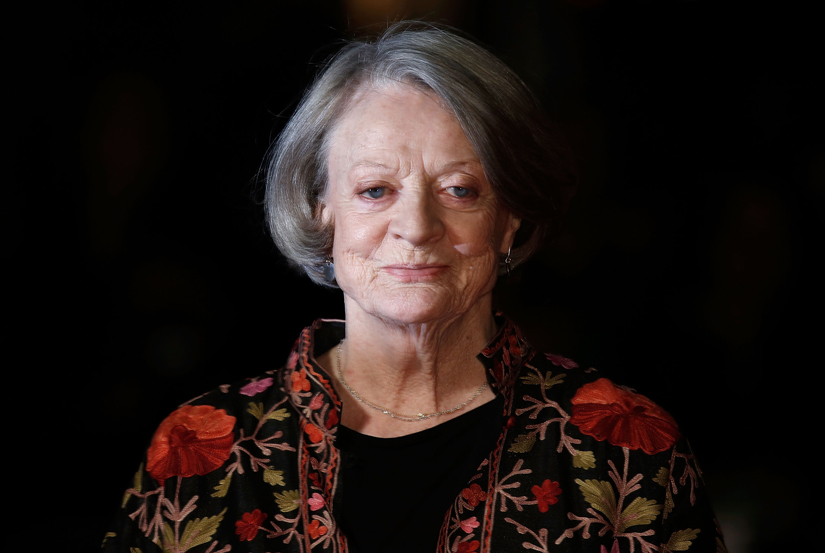
- Golden Globe Awards
Maggie Smith
Julian Fellowes gives her the best lines in Downton Abbey, she was J.R. Rowling’s first and only choice to play Professor McGonagall in the Harry Potter movies, Dustin Hoffman went backstage after seeing her in Albee’s Three Tall Women because “she gave a performance the likes of which I have not seen before or since. It was so specific. I just introduced myself to her and I said I've never seen anyone do anything like what you just did.” Playwrights write parts for her, the Queen made her a Dame Commander of the Order of the British Empire (the female equivalent of knighthood), and Hollywood has showered her with awards, including two Oscars, three Golden Globes, three Emmys, three SAGs, and a Tony.I joined the religion of Maggie devotees when I saw her in the West End production of Peter Shaffer’s Lettice and Lovage playing the title role, a part especially written for her and for which she would win the Tony award for her tour de force portrayal of Lettice Douffet, a bored tour guide at the unremarkable Fustian House in Wiltshire, who gives rein to wilder and wilder flights of fancy in her tours to engage the tourists, but mostly to entertain herself – and the audience. There are grand gestures accompanied by flailing wrists and flapping elbows, the nasal voice swoops and swirls, the one-of-a-kind delivery is so calibrated that she pitches each word perfectly till – boom! – the punch is landed and the audience is rolling in the aisles. Yes, there is merit in doing unforgettable Hamlets and Medeas, but if an actor makes the audience laugh that hard and cherish the experience some twenty years later, she has joined the hallowed ranks of those creating magic on stage. (Remember, dying is easy …)And then there’s the main reason to watch Downton Abbey – Maggie as Violet Crawley, the imperious Dowager Countess of Grantham, which she plays with all the disdain and hauteur she can summon. And just when you finish laughing as she nails all the funniest lines in the show, she shows the true heart of the character – a woman far more compassionate and progressive than you would think her circumstances allow.So why is her forte playing these kinds of characters? She explains to the HFPA, “I suppose in a way when you start playing eccentric people, that’s the kind of pigeon hole that you’re put in, whether you like it or not. And they’re much more interesting parts to play, I have to say. It’s much nicer to play somebody absolutely nuts than somebody straightforward, and as I never ever did those sort of juvenile parts, you know, of being the kind, the token ingénue, I just sort of have enjoyed always playing the kind of battier people.”And there is none battier than Miss Shepherd, the Lady in the Van, for which performance Smith received her twelfth Golden Globe nomination this year. It is based on the true story of the woman who lived in the van parked for fifteen years in the driveway of playwright Alan Bennett, who subsequently immortalized her in a play (in which Smith also performed), and now this movie. And she has a field day hurling invective at the neighbors, terrifying the local kids, showing not a shred of gratitude for any favors done her, and then – as is her forte – showing the vulnerable underside of the lonely and scared woman under the battleaxe, but also the joy she takes in simple things like a wheelchair ride as she goes barreling down the street triumphantly waving her crutches. Maggie Smith can make you laugh while she is breaking your heart.“I think that’s probably the relief of playing older parts,” Smith told us when she was asked how she makes it effortless. “I don’t have to pretend. I can feel relaxed about that, but really the joy is being with all the other people involved. There were lots of days when it was raining and it was freezing cold and everybody was exhausted, but we all felt very dedicated to the whole thing.”Serious roles are also a significant part of her career. She played Desdemona in Othello at the Royal National Theater opposite Laurence Olivier, garnering her first Oscar nomination in its film version. She won her first Oscar for The Prime of Miss Jean Brodie, in which she played a forward-thinking Scottish schoolteacher. On television, there is the remarkable solo performance in Alan Bennett’s BBC series Talking Heads in which she portrayed Susan, a vicar’s wife battling alcoholism who has an affair with an Indian grocer in the episode entitled Bed Among the Lentils. Other roles of note are the tiresome old maid Charlotte Bartlett in A Room with a View; the cantankerous Countess of Trentham in Gosford Park; the middle-aged woman desperately seeking love in The Lonely Passion of Judith Hearne; and more recently, the prejudiced housekeeper requiring a hip replacement in India in The Best Exotic Marigold Hotel; and a retired opera singer in the Dustin Hoffman-directed Quartet. This year, as well as Lady, she appeared in My Old Lady with Kevin Kline and the sequel to Marigold Hotel. These are mere highlights in a career spanning more than six decades in theatre, film and television.“I’m just as keen wanting to act as I ever was,” she told us. “I mean, the fact is that it seems to be more difficult to do, but when you’re not working, you feel very bereft. It’s something that is sort of sustaining, and when you’re not working you just feel rather useless. It’s a very strange feeling, so no, I am not withdrawing from working in any way at all. I want to go on and on and on for as long as I can because it’s the most stimulating thing you can do.”

